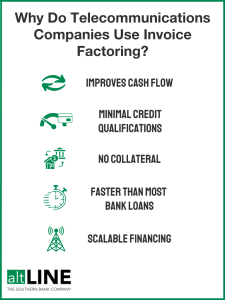Last Updated December 23, 2025
While the telecommunication business can be lucrative, running your own telecom business isn’t a simple, or cheap, undertaking. Between obtaining licenses and permits, paying fees to the FCC, and making necessary business-related investments, you will likely at some point be faced with cash flow challenges that could put important growth goals in jeopardy.
Thankfully, there are financing options to help alleviate these potential stressors and in turn boost cash flow. One of the most popular options is invoice factoring.
Invoice factoring for telecom businesses and telecom contractors isn’t necessarily a widely known option, so let’s dive a little deeper into what exactly telecom factoring entails and how selling unpaid invoices for cash can benefit a telecom contractor or telecommunication business.
Key Takeaways
- Telecom factoring helps telecom businesses and contractors turn unpaid invoices into fast working capital.
- Invoice factoring improves cash flow without requiring collateral and is easier to qualify for than traditional loans.
- Telecom companies use factoring to avoid delays from slow paying customers and cover expenses like infrastructure payroll and maintenance.
What is Telecom Factoring?
Telecom factoring involves a telecom business or telecom contractor selling unpaid customer invoices to a third-party factoring company in exchange for a cash advance. This process is called “invoice factoring”, which is utilized by businesses across a variety of industries. Telecom factoring is most often used by small business owners who want quick access to working capital, rather than relying on customers to pay according to their invoice payment terms (which is a constant challenge for many businesses).
How Does Telecom Factoring Work?
The first step for a telecommunications business considering invoice factoring is to choose its factoring provider. At this stage, a business owner has two options: use a bank factoring company or independent factoring company.
A bank factoring company can typically provide lower rates and greater transparency since it is federally regulated and has direct access to a funding source, cutting out the middleman that independent factors act as.
Invoice Factoring Process for Telecommunications Companies – Step-By-Step
Once you’ve chosen your provider, the invoice factoring process is as follows:
1. Business invoices client. Just as you normally would, you invoice your client for the goods or services your business has provided.
2. Business sells unpaid invoice to factoring company. You sell the unpaid invoice to your factoring company, who then awaits customer payment. Remember, your factor is the one who will receive payment from your client when they’re ready to pay, not you.
3. Factor provides cash advance to business. The factoring company sends you a cash advance against the invoice (typically 80-90% of the total invoice value). This will help your business improve working capital and cover time-sensitive costs.
4. Customer makes invoice payment to factor. Your customer pays the outstanding invoice, sending the payment to your factoring provider.
5. Factor pays remaining value of invoice to business. Once paid, the factoring company forwards the remainder of the invoice value to your business, minus a small factoring fee. This completes the invoice factoring cycle.
Benefits of Invoice Factoring for Telecom Contractors and Businesses
You might be surprised at how many telecommunications and cell tower businesses deal with the same financial problems. Business owners should be aware of the signals or challenges that highlight the need for invoice factoring or another form of alternative financing.
There are several benefits that telecom factoring has for business owners needing relief from challenges pertaining to their accounts receivables.

1. Access Working Capital Without Risking Assets or Equity
Invoice factoring allows telecom businesses and contractors to get a quick cash flow boost while maintaining equity and without having to risk losing assets. The only collateral involved in invoice factoring is the invoice itself, so you can rest assured that your capital and property will not be sacrificed.
2. Lenient Qualification Requirements
Telecom factoring companies are particularly attractive to small businesses because of how forgiving they are when it comes to qualification. Unlike traditional bank loans which require the asking-business to boast a high credit score, telecom factors don’t worry as much about the creditworthiness of the business. The customer is the one paying the invoice, so a factoring company more heavily considers your customers’ credit scores and their ability to make timely payments.
This means that small telecommunications and cell tower businesses that have been turned down for traditional bank loans due to low credit scores can look to factoring as an alternative.
3. Get Cash Fast – No More Waiting for Slow-Paying Customers
The purpose of telecom and cell tower factoring is to accelerate cash flow for businesses with slow-paying customers. Even businesses with customers who pay on-time are often waiting weeks for payment due to Net 30 or Net 60 payment terms. Thanks to factoring, telecom businesses don’t have to wait for customer payments to arrive to pay for routine costs such as network infrastructure setup, maintenance, purchasing new software, or employee salaries. In fact, invoice factoring usually provides cash faster than most traditional bank loans.
4. More Flexibility for Your Clients
Telecom contractors who have tight budgets need to also have quick customer payment terms in order to keep the wheels spinning and avoid dipping into negative cash flow.
Telecom factoring allows businesses to give their customers more leeway regarding payment terms because of the cash advance provided by the factor.
Need Cash Quickly?
Types of Telecom and Wireless Contractors That Benefit from Invoice Factoring
Bank factors like altLINE offer invoice factoring for telecom and wireless contractors who serve in a variety of roles, including:
- Engineering
- Installation, including BTS and fiber optics
- Maintenance
- Power services
Even if you’re a telecom business owner or contractor who serves a different industry than listed above, a factor like altLINE may still be open to working with you.
If you’re looking to improve your cash flow, give altLINE a call at +1 (205) 607-0811 or fill out our online factoring quote form. We have factored over $1B in invoices and take pride in helping our customers reach their business goals.
Michael McCareins is the Content Marketing Associate at altLINE, where he is dedicated to creating and managing optimal content for readers. Following a brief career in media relations, Michael has discovered a passion for content marketing through developing unique, informative content to help audiences better understand ideas and topics such as invoice factoring and A/R financing.










